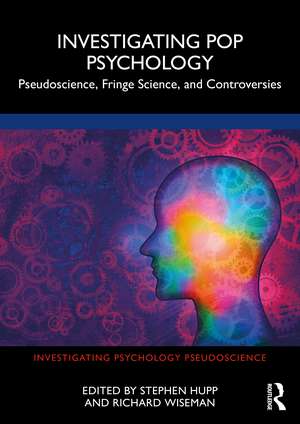Investigating Pop Psychology: Pseudoscience, Fringe Science, and Controversies: Investigating Psychology Pseudoscience
Editat de Stephen Hupp, Richard Wisemanen Limba Engleză Paperback – 14 dec 2022
Psychologists conduct scientific investigations into a lot of strange things including alien encounters, horoscopes, dream interpretation, superstition, and extrasensory perception (ESP). Through a digestible, open-minded format combined with relevant and topical case studies such as energy psychology, demonic possession, and horoscopes, this book offers an engaging read which encourages students to think critically about the information they are exposed to during their academic careers and beyond. By taking a fresh look into investigations regarding pseudoscience and fringe science in pop psychology, it celebrates the science of psychology while also providing warnings about the problem of pseudoscience in pop psychology.
Providing tips on how to consider evidence regarding the strength of claims in pop psychology, Investigating Pop Psychology is an ideal resource for undergraduate introductory psychology students and for students studying science and pseudoscience.
Preț: 229.18 lei
Nou
Puncte Express: 344
Preț estimativ în valută:
43.85€ • 45.95$ • 36.25£
43.85€ • 45.95$ • 36.25£
Carte disponibilă
Livrare economică 22 martie-05 aprilie
Livrare express 08-14 martie pentru 21.48 lei
Preluare comenzi: 021 569.72.76
Specificații
ISBN-13: 9780367609948
ISBN-10: 0367609940
Pagini: 176
Ilustrații: 2 Tables, black and white; 2 Line drawings, black and white; 3 Halftones, black and white; 5 Illustrations, black and white
Dimensiuni: 174 x 246 x 21 mm
Greutate: 0.3 kg
Ediția:1
Editura: Taylor & Francis
Colecția Routledge
Seria Investigating Psychology Pseudoscience
Locul publicării:Oxford, United Kingdom
ISBN-10: 0367609940
Pagini: 176
Ilustrații: 2 Tables, black and white; 2 Line drawings, black and white; 3 Halftones, black and white; 5 Illustrations, black and white
Dimensiuni: 174 x 246 x 21 mm
Greutate: 0.3 kg
Ediția:1
Editura: Taylor & Francis
Colecția Routledge
Seria Investigating Psychology Pseudoscience
Locul publicării:Oxford, United Kingdom
Public țintă
AS/A2, Undergraduate Advanced, and Undergraduate CoreCuprins
1. Examining Claims in Pop Psychology 2. Phrenology and Neuroscience 3. Extrasensory Perception, Psychokinesis, and Sensation 4. Dream Interpretation and Consciousness 5. Superstition and Learning 6. Alien Encounters and Memory 7. Learning Styles and Cognition 8. Brain Training and Intelligence 9. Psychosexual Stages and Development 10. Horoscopes and Emotion 11. Spectrophilia and Sexuality 12. Alternative Medicine and Health 13. Selling Flimflam and Social Influences 14. Projective Tests and Personality 15. Demonic Possession & Disorders 16. Energy Psychology and Therapy 17. Postscript: How to Resist False Claims
Notă biografică
Stephen Hupp, PhD, is a Clinical Psychologist and Professor of Psychology at Southern Illinois University Edwardsville (SIUE) in the United States. In 2015, he won the Great Teacher Award from the SIUE Alumni Association. He has published several books including Pseudoscience in Therapy and Dr. Huckleberry’s True or Malarkey? Superhuman Abilities.
Richard Wiseman, PhD, is a Social Psychologist and Professor of the Public Understanding of Psychology at the University of Hertfordshire in the United Kingdom. He has published over 100 academic papers, written several best-selling psychology books (including The Luck Factor and 59 Seconds) and created psychology-based YouTube videos that have attracted over 500 million views.
Richard Wiseman, PhD, is a Social Psychologist and Professor of the Public Understanding of Psychology at the University of Hertfordshire in the United Kingdom. He has published over 100 academic papers, written several best-selling psychology books (including The Luck Factor and 59 Seconds) and created psychology-based YouTube videos that have attracted over 500 million views.
Descriere
Investigating Pop Psychology provides the basic tools required to make evidence-informed decisions and thoughtfully distinguish science from pseudoscience through the application of scientific skepticism.


